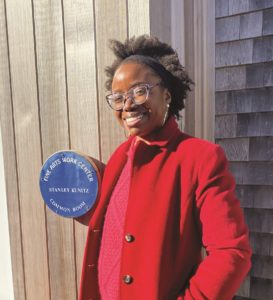It’s an exciting time for Fine Arts Work Center writing fellow Gothataone Moeng.

Her first book, a collection of short stories set in her home country, was published earlier this month, making Moeng one of the first fiction writers from Botswana to publish in the United States. “Most writers from Botswana publish in Botswana, or with South African publishers, and never reach American or U.K. readers,” she says. “There are writers like Alexander McCall Smith and Bessie Head, who write about Botswana, but they are not from Botswana originally.”
Moeng began to write fiction at an early age. “When I was in primary school, we didn’t have a school library,” she says. “Instead, a small truck would park at the school so that the students could register for library cards. That was very exciting for me. I registered and took out books and then the following week I had to return them to the main library in the village, which was a 40-minute walk from the school. Several other students and I made that walk every Friday. We started out as a big group and then dwindled until we eventually were just two or three students.”
As a young reader, Moeng became obsessed with British children’s books. “When I started writing,” she says, “I was trying to write like Enid Blyton. My stories were not at all like my own life.”
It was only later, through reading works by writers like Bessie Head — who was born in South Africa but later moved to Moeng’s home village, Serowe, and wrote about life there — that Moeng’s eyes were opened to the possibility of writing about life in Botswana. “Our work has thematic similarities in that we are both interested in the lives of ordinary women,” Moeng says of Head, “especially women in Serowe, whose lives might be undergoing minor or major changes due to the larger political, historical, and cultural environment they are living in.”
While at university, Moeng workshopped her stories with a group of other aspiring young writers. Inspired by contemporary African women writers such as Chimamanda Ngozi Adichie (Nigeria), NoViolet Bulawayo (Zimbabwe), and Leila Aboulela (Sudan), who were being published internationally to critical acclaim, Moeng began to think of writing as a viable career.
“African literature was really blowing up during that time,” says Moeng. “There was a sense of excitement that was trickling down to us in Botswana.” After working as a journalist when she finished college, she enrolled in an M.F.A. program at the University of Mississippi.
Her recently published story collection, Call and Response, was written during Moeng’s M.F.A. studies and her years as a Wallace Stegner fellow at Stanford. The stories are about women living in the places of her own youth — the village of Serowe and Botswana’s capital, Gaborone, where she attended boarding school before going to university.
“I am interested in how women navigate modern day life in a society that is still very much steeped in its traditions but is at the same time changing rapidly due to the internet, globalization, and other forces,” Moeng says. “A village like Serowe becomes a guardian of past ways and values.”
In Moeng’s story “Small Wonders,” the protagonist is a young woman who moved to the capital to study. When her husband, Leungo, dies in a car crash, Phetso follows her mother’s suggestion and wears traditional mourning clothes: “the loose, below-the-knee midnight-blue dress with a gathered waistline, the matching midnight-blue cape that fell to midback, and a cut of fabric of the same hue, which she wore every morning over her hair.”
“There must have been a good reason for our people to do this,” Phetso’s mother argues. “Better do things the right way.”
Moeng’s detailed descriptions of Phetso’s state of mourning are masterful and moving. The young widow sees glimpses of her husband in strangers, such as the “folded softness” where the head of an impatient man in front of her in line meets his neck: “She wanted to reach out and touch the sweat-slick folds, feel them between her fingers. A wonder, that Leungo’s neck would show up on the body of a belligerent stranger.”
The title of the collection “resonates across all of the stories in the tension between the past versus the present,” says Moeng. “They’re about traditional values versus modern values, urban living versus village living, community versus the individual.”
It is this sense of community that Moeng misses the most since she moved to the United States. The youngest of four siblings in a large, extended Christian family, she always had aunts, uncles, and cousins around her. Neighbors from the village would visit unannounced, and all would sit together for no reason other than to keep one another company.
After her fellowship, Moeng says, she plans to return to Botswana. “I would really love to live at home for a longer period of time,” she says. “I would like to live in the village and continue writing there.”
In the meantime, Moeng has come to cherish the community of fellows at FAWC, where she is now working on her first novel.
“Everyone is really sweet and really talented, and it’s interesting to learn from the visual artists who have such a different approach to their work,” she says. “Sometimes I cannot believe that I live in such a beautiful place, where you can walk down the road and see this big body of water.”
